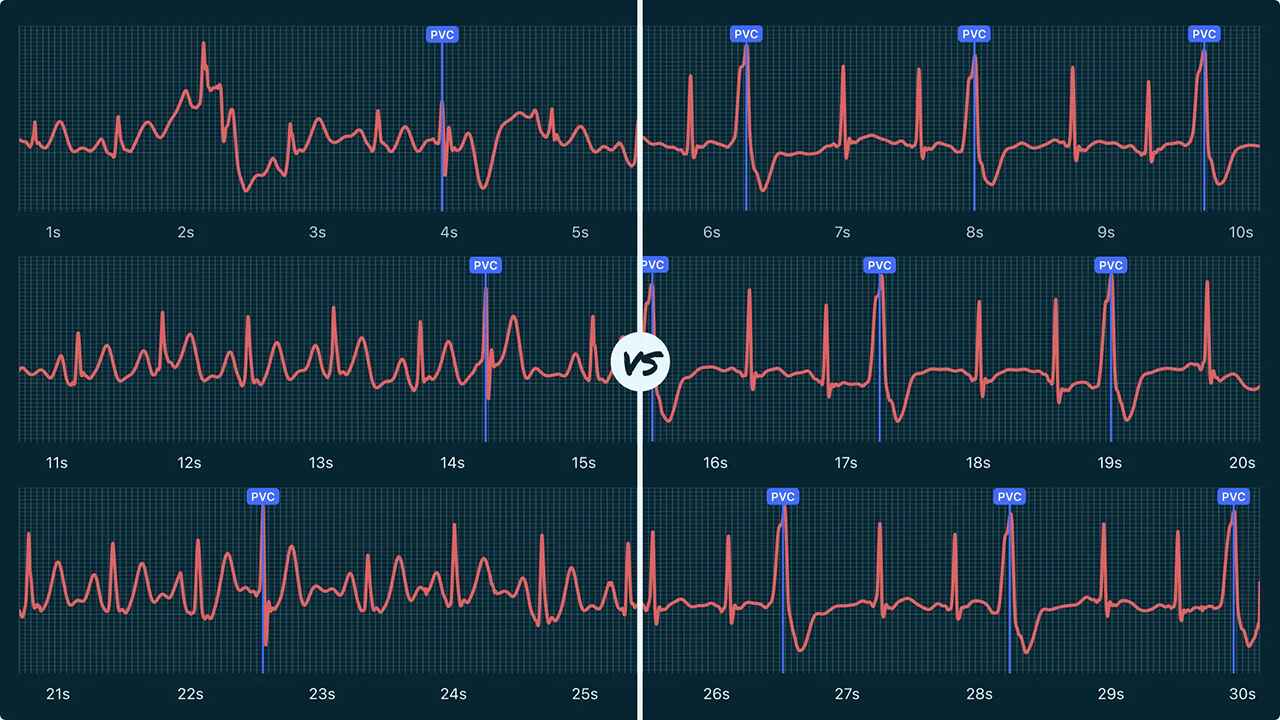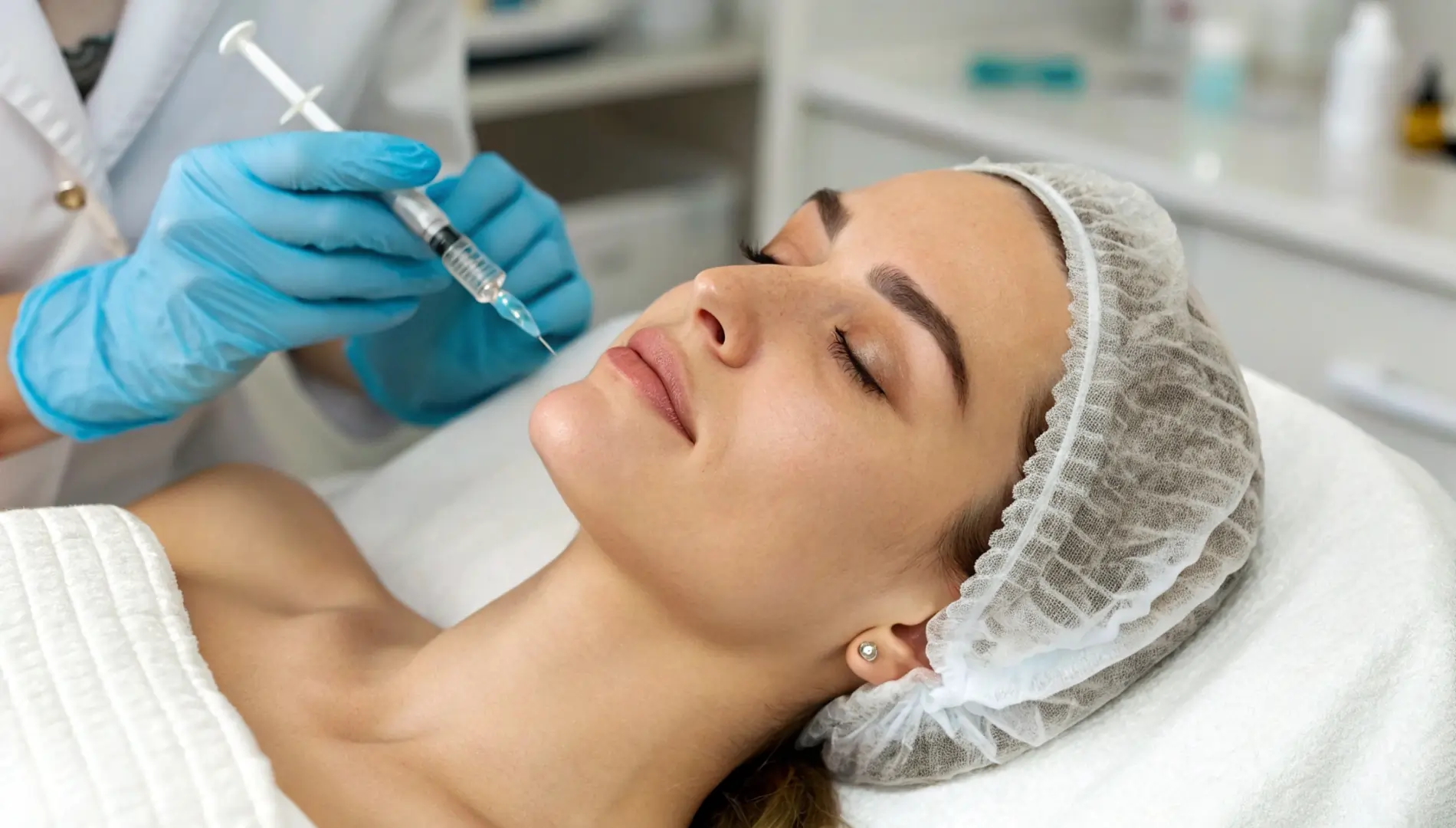Premature ventricular contractions (PVCs), also called premature ventricular complexes, extrasystoles, or premature ventricular beats, are when you feel like your heart is skipping or adding another beat.These are quite common and, in most cases, not a cause for concern.
- What are Premature ventricular contractions (PVCs)?
- Who is most at risk for premature ventricular contractions?
- What causes PVCs?
- Are PVCs dangerous?
- How Common Are Premature Ventricular Contractions (PVCs)?
- When Should You Worry?
- What Are the Symptoms of Premature Ventricular Contractions (PVCs)?
- How can I prevent premature ventricular contractions (PVCs)?
- How Are Premature ventricular contractions (PVCs) Diagnosed?
- How Are PVCs Treated?
- Can a Premature ventricular contractions (PVCs) Cause Sudden Death?
- Conclusion
What are Premature ventricular contractions (PVCs)?
Your heart beats because of electrical signals that keep everything running smoothly, kind of like a well-oiled machine. Premature ventricular contractions (PVCs) happen when one of those signals comes a little too early, causing the lower chambers of the heart (the ventricles) to contract before they’re ready. After that premature contraction, there’s usually a short pause as your heart gets back on track. That’s why it may feel like your heart “missed a beat,” even though it didn’t actually miss anything—it just beats out of sync for a second.
PVCs are not always a cause for concern. However, if they persist over months or years, they may lead to cardiomyopathy, a condition where the heart muscle weakens. Fortunately, PVCs can often be resolved with medication or minimally invasive treatments.
The Mayo Clinic emphasizes that while PVCs are common, they can sometimes be associated with heart disease. They advise that if you experience frequent PVCs or have concerns about your heart health, it’s important to consult a healthcare provider for evaluation and personalized advice.
Who is most at risk for premature ventricular contractions?
PVCs can occur in anyone, but they are more frequent in older adults and individuals with heart disease. The likelihood of experiencing PVCs also rises if you have:
- High blood pressure (hypertension).
- History of heart attacks.
- Hypertrophic cardiomyopathy.
- Heart failure.
What causes PVCs?
premature ventricular contractions (PVCs) can happen for a variety of reasons, and often there is no clear cause. Here are some common triggers:
Stress
Both emotional and physical stress can significantly impact the heart’s rhythm. Emotional stress, such as anxiety, worry, or significant life events, can cause the body to release stress hormones like adrenaline, which can overstimulate the heart. Physical stress, such as illness or overexertion, can also lead to irregular heartbeats.
Caffeine or Alcohol
Excessive consumption of caffeine, found in coffee, energy drinks, and some teas, can stimulate the heart and cause it to beat faster, increasing the risk of PVCs. Similarly, alcohol, especially when consumed in large amounts, can disrupt the electrical signals in the heart, making irregular beats more likely.
Vigorous physical activity
While exercise is generally beneficial for heart health, intense or strenuous physical activity can sometimes trigger PVCs in certain individuals. This is especially true for people who already have an underlying heart condition or are dehydrated during exercise.
Sleep Problems
Lack of adequate rest, whether due to insomnia, an irregular sleep schedule, or conditions like sleep apnea, can put stress on the heart. Sleep apnea, in particular, causes intermittent pauses in breathing during sleep, leading to fluctuations in oxygen levels that can contribute to PVCs.
Medications
Some medications can make PVCs more likely, especially stimulants like decongestants used for colds and allergies or asthma inhalers that contain beta-agonists. These medications can affect the heart’s rhythm by increasing the speed or force of contractions.
Health Conditions
Several medical conditions can raise the risk of premature ventricular contractions (PVCs), including:
- High Blood Pressure (Hypertension): Increased pressure on the heart can strain its muscles and disrupt electrical activity.
- Heart Disease: Structural or functional abnormalities in the heart can predispose individuals to irregular rhythms.
- Electrolyte Imbalances: Essential minerals like potassium, magnesium, and calcium play a key role in the heart’s electrical function. Imbalances in these electrolytes can disrupt normal rhythms and lead to PVCs.
By addressing these factors through lifestyle changes or medical interventions, the frequency and impact of premature ventricular contractions (PVCs) can often be reduced.
Dr. Jeanne E. Poole, a cardiologist at the University of Washington, notes that PVCs are frequently triggered by factors such as excessive caffeine intake, stress, or lack of sleep. She states, “It is most often a benign situation if the person is otherwise healthy.” She also mentions that over-the-counter decongestants, antihistamines, thyroid problems, or electrolyte abnormalities can increase the occurrence of PVCs.
Are PVCs dangerous?
The good news is that premature ventricular contractions (PVCs) are usually harmless, especially if your heart is healthy. Many people have them and never even know it. Frequent PVCs can sometimes be a sign of an underlying heart problem that needs attention. It’s a good idea to talk to your doctor.
How Common Are Premature Ventricular Contractions (PVCs)?
Premature ventricular contractions (PVCs) are extremely common and can occur in individuals of all ages. Studies indicate that up to 75% of people experience PVCs at some point in their lives, although many may not even notice them.
When Should You Worry?
PVCs are usually nothing to stress about, but you should definitely call your doctor if you:
- Are short of breath
- Feel dizzy or faint
- Have chest pain
- If you experience palpitations or irregular heartbeats during prolonged stretching.
What Are the Symptoms of Premature Ventricular Contractions (PVCs)?
Premature ventricular contractions (PVCs) often produce minimal or no noticeable symptoms. However, when symptoms do occur, they are typically associated with unusual sensations in the chest. These may include:
- A fluttering or flutter-like feeling.
- Dizziness or lightheadedness.
- pounding or jumping sensation in the chest.
- A feeling of being on the verge of fainting.
- Perceptions of skipped or missed heartbeats.
Although these symptoms can be unsettling, they are usually harmless. If they persist or significantly impact daily life, it’s a good idea to consult a healthcare provider for further evaluation.
How can I prevent premature ventricular contractions (PVCs)?
You may be able to improve your overall heart health by doing the following, but there is no way to prevent premature ventricular contractions.
Maintain a healthy weight: Work to achieve and maintain an ideal weight for your height, gender, and body type.
Avoid harmful substances: Quit smoking completely and minimize your alcohol and caffeine intake, as these can cause irregular heartbeats.
Follow a heart-healthy diet: Include plenty of fruits, vegetables, whole grains, lean proteins, and healthy fats in your diet to support cardiovascular health.
Exercise regularly: Participate in a combination of aerobic activity, strength training, and stretching exercises to keep your heart strong and healthy.
Manage your cholesterol and blood pressure: Work with your healthcare provider to maintain healthy cholesterol and blood pressure levels, both of which are critical for heart health.
Reduce stress and anxiety: Use stress management techniques such as meditation, deep breathing exercises, or talk therapy to help manage stress and anxiety.
Prioritize sleep: Aim for at least seven hours of quality sleep each night to allow your body and heart to rest and recover.
Making these lifestyle changes can improve your overall heart health and may help minimize the occurrence of PVCs.
How Are Premature ventricular contractions (PVCs) Diagnosed?
If you’re noticing symptoms, your doctor might run some tests to figure out what’s going on. These could include:
Blood test: Blood tests are done to check potassium levels and thyroid hormone balance.
Electrocardiogram (EKG): This records your heart’s electrical activity and can spot Premature ventricular contractions (PVCs).
Holter monitor: This is a portable EKG you wear for a day or two to catch Premature ventricular contractions (PVCs) that don’t happen all the time.
Echocardiogram: This ultrasound of your heart checks for structural issues.
Stress test: This measures your heart’s response to exercise.
How Are PVCs Treated?
For most people, treatment isn’t necessary. If your PVCs are bothering you or linked to another condition, though, your doctor might suggest:
Lifestyle changes: Cutting back on caffeine, alcohol, or stress can make a big difference.
edications: Beta blockers or other drugs can help regulate your heart rhythm.
Addressing underlying issues: If another health problem is causing your PVCs, treating that issue should help.
Ablation: In rare cases, a procedure to zap the area causing PVCs might be recommended.
Can a Premature ventricular contractions (PVCs) Cause Sudden Death?
Premature ventricular contractions (PVCs) are typically harmless in healthy individuals and rarely lead to sudden cardiac death. However, in certain cases, they can increase the risk of serious complications. This elevated risk is primarily associated with individuals who have underlying structural heart disease, such as cardiomyopathy, heart failure, or a history of heart attack.
The location of PVCs within the heart can also play a role. PVCs originating from specific areas, such as the left ventricle, may carry a higher risk of triggering life-threatening arrhythmias. Additionally, frequent PVCs that go untreated over time can sometimes lead to a weakened heart muscle, a condition called PVC-induced cardiomyopathy, which can further increase the risk of sudden cardiac events.
For the vast majority of people, especially those with no significant heart conditions, PVCs are benign and do not pose a danger.
Conclusion
PVCs can be scary, but they are often harmless and very common. Knowing what premature ventricular contractions (PVCs) are and what triggers them can help you stay calm and make smart choices for your health. If you are ever in doubt, don’t hesitate to contact a healthcare provider. Your heart has a big job to do, and it’s always worth making sure it’s strong.

















Premature ventricular contractions (PVCs) can be quite unsettling, but they are often harmless. It’s important to monitor triggers like stress, caffeine, and lack of sleep to manage them effectively. Regular exercise is beneficial, but overexertion might increase the risk of PVCs in some individuals. If PVCs become frequent or severe, consulting a healthcare provider is advisable. Could underlying heart conditions be a major factor in the occurrence of PVCs? Given the growing economic instability due to the events in the Middle East, many businesses are looking for guaranteed fast and secure payment solutions. Recently, I came across (LS) — they promise instant bank transfers with no chargebacks or card verification. It says integration takes 5 minutes and is already being tested in Israel and the UAE. Has anyone actually checked how this works in crisis conditions?